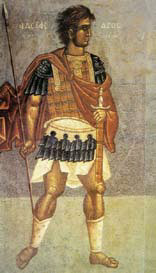Without doupt, purity is the top virtue of the young commander, even bigger than his unique and insuperable bravery. The ancient writers had noted this, as Ploutarchos write that everybody admired Alexander, because he showed much purity facing the women of Persia over his bravery to the Persians (” ὡς πλείονα ταῖς Περσῶν γυναιξὶ σωφροσύνην ἢ Πέρσαις ἀνδρείαν ἐπιδεδειγμένον “, ” Ἀλέξανδρος ” 30. 10-11). From every side of his moral of purity was accepted and as much as his accusers did not find sources in order, to slander him. This virtue of the young man surprised us, when you consider that the before Christ years it was not considered immoral as a sin, but it had its own goddess.
virtue of the young man surprised us, when you consider that the before Christ years it was not considered immoral as a sin, but it had its own goddess.
Great Basil of Caesarea mentioned an incident that was mentioned by Arrianos (” The Anabasis of Alexander ” 4,19,6) and by Ploutarchos (The life of Alexander 21 k.e. and about Alexander 6,338de).
His soldiers present before him at Sousa Darius’ captured family. Amongst its members the beauty of his wife and the Persian king’s daughters were distinguished. Alexander respected them (” κατῃδέσθη “) and he such a young man, not even thirty then, but ruler of the world-did not allow himself to lift his head and eyes, to see their faces, because it regarded it was a disgrace for him who conquered so many men to be beaten by women (” αἰσχρόν εἶναι κρίνων τὸν ἄνδρα ἑλόντα γυναικῶν ἡττηθῆναι ” [P.G. 31, 577]). This brilliant incident was narrated with praising judgement for Alexander’s wisdom and other fathers’ saint Gregory Theologos (P.G. 37, 738), saint Maximus the Confessor (P.G. 91, 741), Isidore of Pelusium (P.G. 78, 773) the Holy Fotious (P.G. 102, 688 and 103, 1444).


